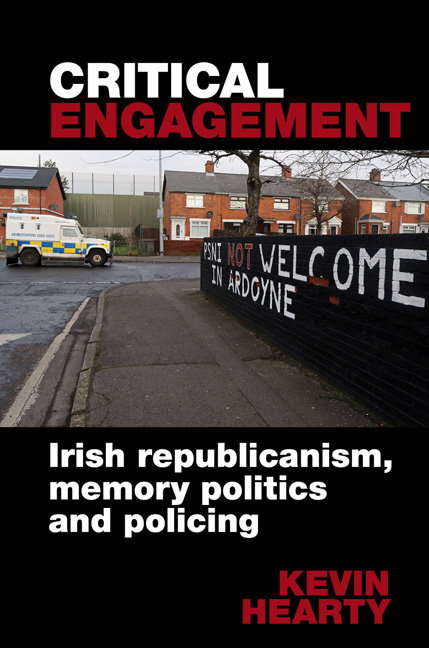Book contents
- Frontmatter
- Contents
- Acknowledgements
- List of Figures and Tables
- List of Abbreviations
- Introduction
- 1 Understanding a Fraught Historical Relationship
- 2 Irish Republican Memory as Counter-Memory
- 3 Ideology and Policing
- 4 The Patriot Dead
- 5 Transition, ‘Never Again’ and ‘Moving On’
- 6 The PSNI and ‘Community Policing’
- 7 The PSNI and ‘Political Policing’
- Conclusion
- References
- Index
6 - The PSNI and ‘Community Policing’
- Frontmatter
- Contents
- Acknowledgements
- List of Figures and Tables
- List of Abbreviations
- Introduction
- 1 Understanding a Fraught Historical Relationship
- 2 Irish Republican Memory as Counter-Memory
- 3 Ideology and Policing
- 4 The Patriot Dead
- 5 Transition, ‘Never Again’ and ‘Moving On’
- 6 The PSNI and ‘Community Policing’
- 7 The PSNI and ‘Political Policing’
- Conclusion
- References
- Index
Summary
Introduction
This chapter critically evaluates how memory interacts with police reform to frame opposing narratives of ‘community policing’. Interrogating changes in police symbolism, composition and the PSNI's supposed core function in working-class republican communities, it examines how a problematic legacy continues to impact on views of ‘community policing’. The ‘critical engagement’ narrative of ‘community policing’ that is framed by assertions of newness and change, and the critical counter-narrative of ‘cosmetic reform’ dismissing police reform as an attempt to normalise ‘British’ policing are both dissected. Although these narratives are intrinsically linked to ideologised views of involvement in transitional processes, this chapter looks beyond the ‘black-and-white’ views proffered by competing narratives to draw on the nuances of the overlapping ‘grey’ areas that define lived reality on the ground. Viewing this through competing lenses of continuity and rupture, it highlights where reform has successfully cultivated a new image of the PSNI and a new attitude towards ‘community policing’ within republican communities and where reform has struggled to do so. At this introductory stage, it must be noted that the generic term ‘community policing’ remains undefined, contested and contingent upon context. Notwithstanding this, the term is used here to denote the Patten vision of ‘policing with the community’ whereby a co-operative community–police relationship that tackles and prevents anti-social behaviour and crime displaces a previous relationship of political hostility and suspicion.
Symbolism
The Independent Commission on Policing for Northern Ireland recognised the divisive impact that the overtly Unionist ethos, culture and composition of the RUC had on police ownership in the North of Ireland. Culling policing of divisive symbolism was a necessary first step in addressing the problematic legacy of police ownership. Police reform duly introduced a change of name, uniform and symbolism. Striving for inclusivity, reform made the PSNI appear overtly neutral where the RUC had been overtly Unionist. Changing the name and uniform of contested police forces has been tried elsewhere in a bid to bring previously excluded groups ‘on board’. In the Basque Country, the autonomous police force was given the Basque cultural name ‘Ertzaintia’ along with a new uniform intended to reflect their Basque origins; these reforms did not prevent the separatist Euskadi Ta Askatasuna (ETA) from attacking the force.
- Type
- Chapter
- Information
- Critical EngagementIrish republicanism, memory politics and policing, pp. 183 - 216Publisher: Liverpool University PressPrint publication year: 2017



